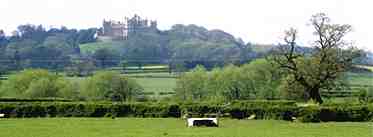
Belvoir
Castle in the English countryside.
If you are looking at this page without frames, there is more information about medieval writing to be found by going to the home page (framed) or the site map (no frames).
| Law and Administration (5) |
| By the end of the 13th century in England everybody was not literate, but the legal and administrative processes of society were being conducted in literate mode. If you were not able to read and write yourself, there were occasions when you had to get on to somebody who could. At least, that was how it was believed to be by the men at the top. In the years after 1278 Edward I, in a spirit of legalistic springcleaning, sent his justices around the country to demand that people show the written evidence for any special privileges or exemptions that they were claiming. These have been referred to as the quo warranto enquiries, the Latin tag just being an educated way of saying "Where's your charter, mate?" However, the people at the top are never quite as in control as they might think of what is going on around the periphery. This is where Earl Warenne and his sword come in. |
| It simply was not the case that every right and privilege in the land was ratified by charter. Oral tradition from time out of mind was cited in many cases and testified by witnesses who still claimed to be the guardians of corporate memory. The rules of the game had to be modified to admit the existence of some strands of legally ratified oral tradition. But they were not to do it any more. Put it in writing. |
| One of the problems with the Earl Warenne story is that the commissioners were not actually enquiring as to the right by which people held their lands. Either the earl was a bit of a dill, or the story got a bit confused as it travelled around. The earl's sword symbolises the continuing existence of traditions which were supposed to be extinct, but still had some existence, even if battered and rusty like the sword. Besides, it would have been nice to believe that somebody would defiantly stand up to a bossy old thug like Edward I. |
| We are thoroughly accustomed these days to everything being ratified in writing. You can't drive a car, get money from the bank, keep a dog or get yourself educated without filling in the appropriate paperwork. However, there are still funny little pockets where things can still be ratified by deed rather than written word. A struggle of the 20th century in Britain has been in maintaining access to the countryside in the face of resistance by farmers to the increasing population of city dwellers who have wanted to use public footpaths through private land for their recreation. Farmers could only close these footpaths if they had not been used for a specific period, so groups of country loving activists worked out strategic schemes of walking to ensure that all the paths were walked at least the minimum number of times to keep them open. Of course, they had to publicise this in order that they were seen doing it. This little strand of witnessed oral testimony may be one of the last relics of a pattern of preliterate legal process from the early middle ages. |
 |
|
Belvoir
Castle in the English countryside. |
|
|
|
|
|
If you are looking at this page without frames, there is more information about medieval writing to be found by going to the home page (framed) or the site map (no frames). |